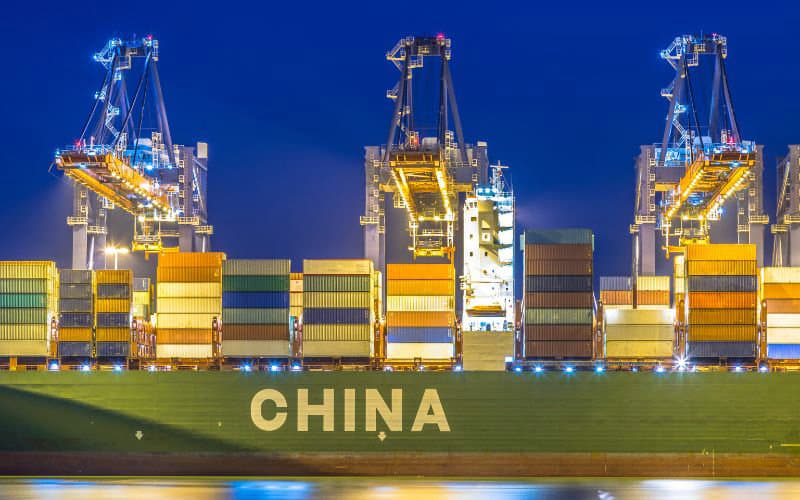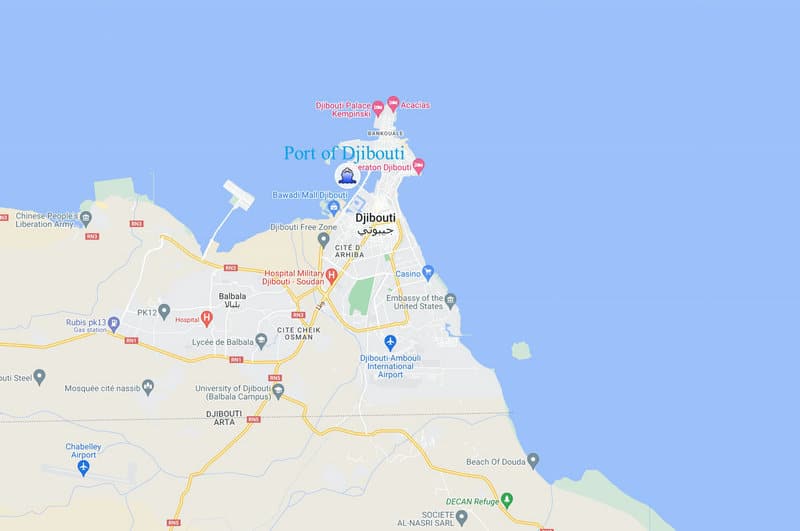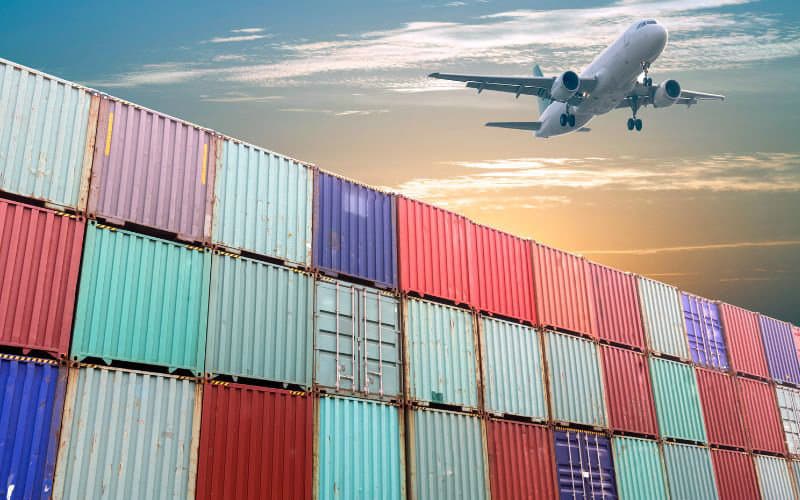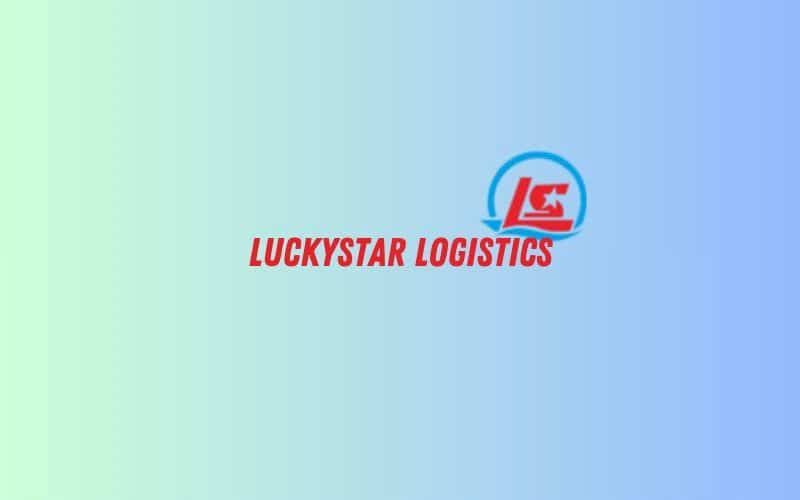
Exploring Your Shipping Options from China to Ethiopia
Regarding shipping your cargo from China to Ethiopia, two main shipping options you can choose based on the volume of your cargo, budget and convenience considerations: air freight and sea freight.
Air Freight
If you choose air freight for transportation from China to Ethiopia, you prioritize speed and reliability. You’ll find that air cargo transportation is well-suited for your time-sensitive or high-value shipments, offering shorter transit times compared to sea freight.
Main Airports for Air Shipping from China to Ethiopia
In China
- Shanghai Pudong International Airport (PVG)
- Beijing Capital International Airport (PEK)
- Guangzhou Baiyun International Airport (CAN)
- Hong Kong International Airport (HKG)
- Chengdu Shuangliu International Airport (CTU)
- Shenzhen Bao’an International Airport (SZX)
In Ethiopia
Addis Ababa Bole International Airport (ADD)
- The main international airport in Ethiopia
- Main hub for Ethiopian Airlines
- Major gateway for international air cargo traffic to/from Ethiopia
Key Points to Consider:
- Freight Rates: Air freight can be more expensive, but you are paying for a swifter and more direct route to Ethiopia.
- Transit Times: Typically, air freight from China to Ethiopia takes approximately 3 to 7 days, a significant reduction compared to ocean transit times.
- Air Freight Capacity: Ethiopian Airlines operates a modern fleet, including the Airbus A350-900 Freighter, ensuring your cargo is transported with the latest in aviation technology.
- Cargo Transport Services: With a range of options from regular shipment tracking to e-cargo online booking, the collaboration between airports and airlines offers a seamless shipping experience.
- Professional Handling: Both Shenzhen Bao’an and Bole International Airport are adept at handling various cargo types, with freight forwarders available to guide you through the process.
Sea Freight & Container Shipping

When shipping cargo from China to Ethiopia, you also have the option to use full container loads (FCL) or less than container loads (LCL), depending on your logistics needs and volume of goods. Your goods will typically be shipped to the Port of Djibouti, servicing Ethiopia’s import and export requirements.
Full Container Load (FCL) Shipping
FCL shipping is your go-to option if you have enough goods to fill an entire container. This can be more cost-effective and offers a single container for your goods exclusively, providing a secure and undisturbed space for transport. Shipping a 20-foot container can typically hold up to 10-11 standard pallets, while a 40-foot container can accommodate up to 20-21 pallets. Depending on your departure and arrival ports, transit times can vary, but major Chinese ports like Shanghai, Guangzhou, Dalian, Tianjin, and Qingdao provide regular services to Djibouti. With FCL, your shipping cost is also likely to be more predictable and fixed.
Less than a Container Load (LCL) Shipping
For smaller shipments that do not require a full container, LCL shipping is an efficient alternative. Your cargo will be consolidated with other shippers’ goods to fill a container. This requires intricate logistics and coordination by your freight forwarder, who will manage the consolidation and deconsolidation process. LCL can offer flexible shipping solutions and potentially lower costs as you pay only for the space you use. However, additional handling for LCL can lead to longer transit times compared with FCL.
Main Ports for Sea Shipping from China to Ethiopia
Your sea freight journey from China to Ethiopia will primarily involve transport to the principal transit point—the Port of Djibouti. Serving as a gateway to Ethiopia, Djibouti acts as a hub for cargo transport due to its strategic location and connectivity to Ethiopian markets.

Major Chinese ports facilitating this sea route include Shanghai, Guangzhou, Dalian, Tianjin, and Qingdao. Each has its own schedules and routes, with carriers operating regular departures to meet different shipping requirements. The choice of port can affect both the shipping cost and transit time, so it is essential to coordinate with a proficient freight forwarder like Luckystar Logistics for optimal routing and scheduling decisions.
Different Types of Shipping Services from China to Ethiopia
Door-to-Door Delivery
Door-to-door delivery simplifies the shipping process by taking responsibility for the entire journey of your shipment. When you opt for this shipping service, a carrier will collect the cargo from the specified location in China and deliver it to the final address in Ethiopia. This service is an all-inclusive shipping method that minimizes your effort, making it a convenient choice if you seek a hassle-free shipping experience.
- Benefits: Simplified process, convenience, minimal involvement required, competitive pricing
- Cargo: Suitable for various cargo types
- Convenience: High
Express Shipping
For time-critical deliveries, express shipping offers the fastest transport available. Using air freight and expedited services, this shipping mode is ideal for urgent or high-value commodities. With express shipping, your goods will have shortened transit times, and you’ll benefit from enhanced tracking capabilities throughout the shipment’s journey from China to Ethiopia.
- Speed: Fastest delivery option
- Cost: Higher than standard options due to speed
- Tracking: Advanced tracking features
Through the right combination of shipping methods, including door-to-door and express options, you can efficiently manage your cargo transport needs while balancing time and budget constraints.
Shipping Costs from China to Ethiopia
When shipping from China to Ethiopia, you must be aware of the varying costs associated with air freight and container shipping. These costs can fluctuate based on factors like the shipping mode, package weight, and carrier rates.
Air Freight Costs for shipping from China to Ethiopia

- General Air Cargo: $3.00 – $7.00 per kg
- Express Air Freight: $10.00 – $15.00 per kg
The rates can vary depending on factors like:
- Origin airport in China (e.g. Shanghai, Beijing, Guangzhou, Hong Kong)
- Destination airport in Ethiopia (Addis Ababa Bole International Airport)
- Airline used (e.g. Ethiopian Airlines, Emirates, Qatar Airways)
- Weight and dimensions of the shipment
- Any special handling requirements
Some examples of air freight rates from major airports:
Shanghai (PVG) to Addis Ababa: Around $4-5 per kg for general cargo over 500kg
Hong Kong (HKG) to Addis Ababa: Around $56-68 per kg for 300-1000kg
Beijing (PEK) to Addis Ababa: Around $108-172 per kg for 100-300kg shipments
How Much Does Container Shipping Cost from China to Ethiopia
Container shipping rates are predicated on container size, with the most common sizes being 20ft and 40ft containers. The frequency of ships, their routes, and carrier choices will also impact the final shipping cost from China to Ethiopia:
- 20ft Dry Container (FCL): $2,000 – $3,000
- 40ft Dry Container (FCL): $3,000 – $5,000
- 40ft High Cube Container: $3,500 – $5,500
- 40ft Reefer (Refrigerated) Container: $5,000 – $8,000
- LCL (Less than Container Load) shipping rates are higher per unit volume, around $20-$30 per cubic meter.
Transit Times for Shipping from China to Ethiopia
Air Freight Times from China to Ethiopia
On average, air freight can be the quickest option to transport your cargo from China to Ethiopia. Flight times approximately range from 3 to 7 days, including time for customs clearance and ground handling on both ends. If you choose express door-to-door air shipping, the shipping time will be 7-14 days.
How Long does It Take to Ship a Container from China to Ethiopia by Sea?
| Door-to-Door (days) | Port-to-Port (days) | |
| Sea Freight FCL | 40-55 | 30-40 |
| Sea Freight LCL | 40-65 | 40-55 |
Factors Affecting Your Shipping Transit Times
- Port of departure and arrival: Some ports may offer faster routes due to the higher frequency of departures.
- Customs policies: Delays can occur depending on the efficiency of customs in both the origin and destination countries.
- Weather and sea conditions: Particularly for sea freight, inclement weather can disrupt shipping schedules.
- Logistical efficiency: The speed at which your cargo is loaded, unloaded, and transferred impacts overall transit time.
Tips for Mitigating Delays in Transit
- Choose reliable carriers: Opt for carriers with a proven track record.
- Plan for customs: Ensure all paperwork is accurate and complete to avoid customs-related setbacks.
- Monitor weather patterns: Stay informed of the weather along your chosen route and plan accordingly.
Necessary Documentation for Shipping from China to Ethiopia

- Commercial Invoice
- Packing List
- Bill of Lading (for sea freight) or Airway Bill (for air freight)
- Certificate of Origin
- Product Certificate
- Combined Certificate of Value and Origin (CCVO)
Other Possible Documents
- Import License/Registration
- Insurance Certificate
- Tax Identification Number (TIN) Certificate
- Pre-Shipment Inspection Report
- Transit Document
- VAT Certificate
- Regulatory Permits
Understanding these prerequisites will facilitate a successful and hassle-free experience when importing your goods from China into Ethiopia.
Duties and Taxes in Ethiopia
Import Duties
- Ethiopia follows the Harmonized System (HS) codes for customs duty rates
- Import duty rates range from 10% to 35% depending on the HS classification of the goods
- Duties are calculated on the CIF (cost, insurance, freight) value of the imported goods
Value Added Tax (VAT)
- The standard VAT rate of 15% applies to most imported goods and services
- VAT is calculated on the CIF value plus any applicable import duties
Excise Tax
- The excise tax applies to certain imported goods like vehicles, alcohol, tobacco, etc.
- Excise rates generally range from 5% to 500%, with higher rates for used vehicles
Surtax
- A 10% surtax applies on the total CIF value + customs duty + VAT + excise tax
Withholding Tax
- 3% withholding tax on the CIF value of imported goods
Other Taxes
- A Social Welfare Levy of 3% on CIF value was introduced in 2022
- Stamp duties may apply on certain import documents
The total tax liability is calculated sequentially by first applying customs duty on CIF value, then excise tax (if applicable), VAT, surtax, withholding tax and the new social welfare levy. Importers need to obtain import permits, registration numbers, tax IDs and follow documentation requirements like commercial invoices, packing lists, certificates of origin etc. Certain exemptions and duty relief may apply for investors, diplomats, industrial park imports etc. based on Ethiopia’s regulations.
Custom Formalities
China Customs Contacts:

- General Administration of Customs of China
- Address: No. 6 Jianguomennei Avenue, Dongcheng District, Beijing 100730, China
- Website: http://english.customs.gov.cn/
Ethiopia Customs Contacts:

- Ethiopian Customs Commission (ECC)
- Address: Ethiopian Customs Commission P.O. Box 5605 Addis Ababa, Ethiopia
- Website: http://ecc.gov.et/web/ecc
Prohibited & Restricted Items
When you’re shipping from China to Ethiopia, it’s essential to be aware of the prohibited and restricted items to ensure compliance with both countries’ regulations. Ethiopia has specific rules in place that restrict or entirely prohibit the import of certain goods.
Prohibited Items:
- Narcotics: Illicit drugs are banned in nearly all countries worldwide, including Ethiopia.
- Counterfeit goods: Shipping of fake branded products is illegal.
- Pornographic materials: Such items are strictly forbidden by Ethiopian customs.
Restricted Items:
- Firearms and explosives: Specific licenses are required to import these items into Ethiopia.
- Alcohol: There are limitations on importing alcoholic beverages.
- Pharmaceutical products: These require special permits from health authorities.
The Ethiopian Government has also issued bans on various imports at times to manage economic stability. For instance, in a recent move, Ethiopia banned the import of 38 different products, which were considered luxury items.
Before you export goods from China, ensure you have a clear understanding of these restrictions. Restricted items might need special permits or may be subject to additional taxes. Always check the latest regulations as policies can change.
Note: Failing to comply with these regulations can lead to seized shipments or fines, which would impact your business operations negatively. Responsible importing starts with informed shipping practices.
Insurance for Shipping from China to Ethiopia
When transporting goods from China to Ethiopia, securing cargo insurance is a crucial step in protecting your shipment against unforeseen events. As your freight forwarder may advise, cargo insurance covers loss or damage of freight during transportation. Considering the distance and the complexities of international shipping, insurance is not just an option, it’s a necessity.
Types of Cargo Insurance:
- All-Risk Insurance: Offers comprehensive coverage against all possible risks.
- Named Perils Insurance: Protects against specific risks listed within the policy, such as theft or fire.
- Free of Particular Average (FPA): Covers only partial loss on the part of the shipment under certain conditions.
Remember, investing in cargo insurance when shipping from China to Ethiopia is a strategic decision that protects your business from unpredictable elements across the shipping journey.
Why Choose Us

When you’re seeking efficient and reliable shipment services from China to Ethiopia, understanding the capabilities and offerings of your freight forwarder is paramount. Luckystar Logistics stands out in the logistics field, providing expert guidance and tailored services for your shipping needs. With an emphasis on quality service at competitive prices, your business can benefit from a partner that values both time and cost efficiency.
